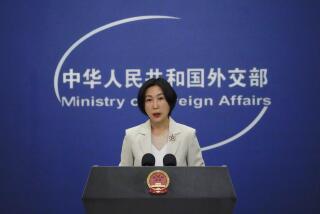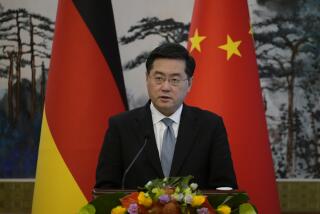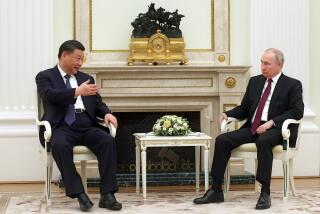China Has No Regrets Over Not Supporting Gulf War, Qian Says : Policy: The foreign minister says the conflict cannot be a precedent for settling international issues with force.
- Share via
BEIJING — Foreign Minister Qian Qichen, in a wide-ranging news conference Wednesday, defended Chinese policies on a host of issues including missile sales, the Gulf War, human rights and Beijing’s claims of sovereignty over Taiwan.
Qian said that China has no regrets over its refusal to support the U.S.-led multinational force that drove the Iraqis from Kuwait. China voted consistently at the United Nations in favor of sanctions against Iraq but abstained on the crucial vote authorizing military action.
“The parties concerned have to return to the negotiation table to resolve their disputes, and this shows that the use of force can in no way solve all problems,” Qian said. “The Gulf War cannot be made a precedent for settling international issues by the use of force.”
During much of the 1980s, China was a major supplier to both Iraq and Iran of weapons, including anti-ship Silkworm missiles. It also has sold medium-range ballistic missiles to Saudi Arabia.
When asked whether China would abide by missile-technology control rules, worked out at a recent meeting of 15 nations in Tokyo, Qian said that because China did not join the meeting or the agreement that came out of it, Beijing is not bound by the restrictions. Qian said that China is a relatively small weapons exporter, and he called on large exporters to exercise greater restraint.
Qian also presented an unyielding defense of Beijing’s position that foreign countries have no right to impose human rights standards on China.
“Some people say that human rights have no boundaries,” he said. “This does not square with fact. . . . If anyone thinks that human rights have international standards, then those standards must find expression in various international human rights conventions. The sovereign states can either accede to those conventions . . . or they can just stay away. But it is impermissible to impose the standards worked out by one country, or a group of countries, on other countries.”
Questioned about an announcement Tuesday that 1991 defense spending is budgeted to rise 12% over last year, Qian said that China must strengthen its defense capability. But in both absolute and per capita terms, its military spending remains low. Budgeted 1991 military spending of 32.5 billion yuan ($6.25 billion) works out to only about $5 or $6 per Chinese citizen, he noted.
Addressing the issue of Taiwan, which Beijing views as a breakaway province, Qian declared that attempts by the Nationalist government in Taipei “to secure a so-called ‘living space’ as a political entity in the international arena would only result in the prolongation of the division between the two sides of the Taiwan Strait rather than serving the interests of the reunification of China.”
Both the Communist government in Beijing and the rival Nationalist government in Taipei consider the island part of China. But the two regimes dispute which is the rightful ruler of the country: Beijing has proposed reunification under a “one country, two systems” formula; Taipei presses the idea of “one country, two governments.”
While Beijing does not object to Taiwan’s trade relations with other countries, it opposes a growing effort by Taipei to win official recognition from as many countries or international organizations as possible. Qian warned that Beijing would not tolerate admission of Taiwan to the General Agreement on Tariffs and Trade (GATT), the main organization governing world trade, except as a region of China.
“Because Taiwan is not an independent state, it naturally is not qualified to take part in GATT,” Qian said.
Qian gave the first official confirmation China that a visit by Communist Party General Secretary Jiang Zemin to Moscow is being planned. Soviet sources have said the visit is expected in mid-May. Qian said plans for Jiang’s trip will be discussed during a three-day visit beginning Sunday by Soviet Foreign Minister Alexander A. Bessmertnykh.
More to Read
Sign up for Essential California
The most important California stories and recommendations in your inbox every morning.
You may occasionally receive promotional content from the Los Angeles Times.












